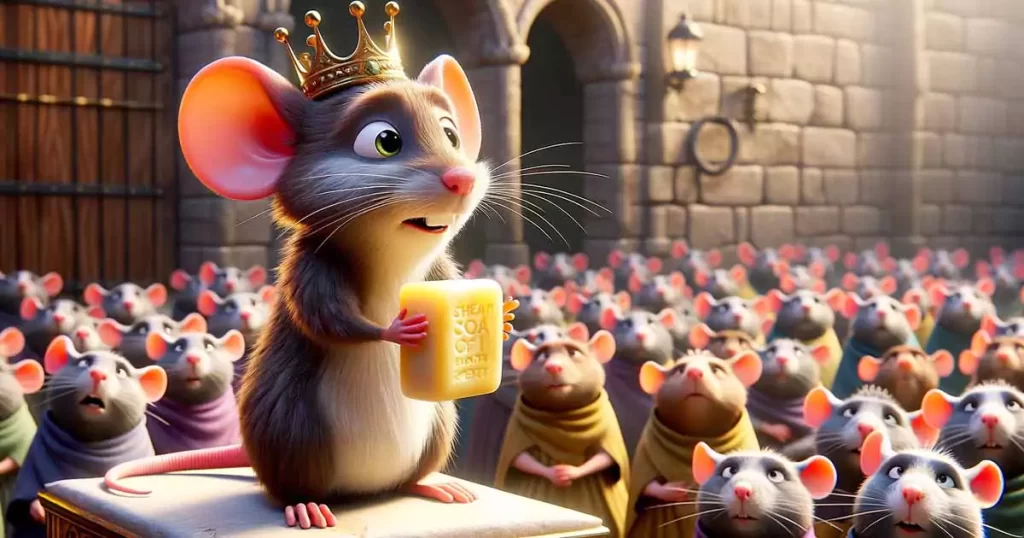
In one of the eastern kingdoms, a dynasty of the greatest rat kings ruled. For many years, the rat state was governed by talented kings, each of whom became famous in their own way.
The Fat King was famous for feeding all the rats so much that they were on the verge of bursting. Not only with waste and leftovers from the royal table, as many did, but also with rice grains. Unfortunately, the king did not reign long. The kingdom could not afford to feed all the rats every day, so the rat king was eaten, and he was considered greedy.
The Peaceful King was famous for never cutting off the rats’ tails as punishment. He believed that punishments were a thing of the past and that everyone should move on without thinking about how things were done before. Unfortunately, the king did not reign long. Without punishment, the rats killed and ate each other, knowing there would be no consequences. Soon the rat king was eaten, and he was considered spineless.
The Affectionate King was famous for listening to complaints from almost all the rats in the kingdom at a royal reception. To some, he granted more grain, to others, he brought security by sacrificing his royal guard or placing them at the head of the state beside him. Unfortunately, the king did not reign long. The rat king tried to please everyone, and he had the most wicked and envious rats from all over the kingdom. Soon the rat king was eaten, and he was considered unserious.
Such was the royal dynasty in this realm. Worthy rat kings who only wanted the best for their rats were eaten. Changes were necessary. Perhaps not great changes, but a radical alteration of the rats’ lives. One thing is certain – changes were necessary.
The next king, after the Affectionate Rat King, was to be the young rat king, who had no nickname yet. Since he had no nickname, he was simply called the king.
The only thing the young king wanted was not to end his reign like his predecessors. The young king was wise despite his age. He tried to learn from his ancestors’ mistakes and give his rats what they truly needed.
The young king believed that no one knew what ordinary rats needed except the rats themselves. So, he decided to ask them himself. However, he decided to do this not like his father, the Affectionate Rat King, and ask everyone, but to choose one rat worthy to speak for all, whom the king himself would select.
For this purpose, the young rat king, disguised as a poor rat, went without guards to the poorest streets of the kingdom. His expectations matched exactly what he saw there – destruction, hunger, theft, cannibalism. The king was not even surprised. Maybe it was because his father, the Affectionate Rat King, and his grandfather, the Peaceful Rat King, always told him about it. They urged him to fight it when he became king.
After passing through the poorest streets of the kingdom, the young king did not find the worthy rat who could share with him the knowledge and experience that would make it clear to him that ordinary rats did not have enough for a better life. He was about to return to his castle when he smelled something burning.
It was not fire, and there was no smoke in sight. The young king trusted his sense of smell and went towards the unpleasant odor. He reached a hole with a very sharp and at the same time pleasant smell and knocked on a door with large cracks.
The young king was answered by a poor rat with sweet ears, a curious nose, and a mobile tail. The king immediately realized that the burning smell he could smell was fate trying to tell him something. The young king asked the poor rat.
“Something is burning, young lady. I could smell it,” said the king.
“I am caramelizing sugar, my king. It’s a bit burnt.”
The king did not know why he should be surprised. The poor rat figured out that he was the king.
“How did you know I was the king?”
“In the poorest streets of this kingdom, no one has ever called me ‘young lady.’ Besides, I have seen you in portraits. You look better in real life.”
There was an awkward pause in the conversation.
“Come in. The king should not stand at the door,” said the poor rat, inviting the king into her hole.
The king was surprised when he entered. There were old pieces of furniture everywhere, an equally old carpet on the floor, and an old fireplace near it. The king felt a sense of home that he missed so much in the castle. He loved the hole apart from the dirt. The room was neat and cozy, like a dollhouse, but there was dirt everywhere. On the old carpet, in the fireplace, and the furniture seemed to be made of dirt.
“Why are you caramelizing sugar?” asked the king suddenly.
The poor rat went to the kitchen and returned to the king with a spoon.
“Taste it,” said the poor rat.
The young king was cautious.
“If I wanted to poison you, I would have done it at my door.”
The young king trusted the poor rat and licked the spoon.
“Caramel. That’s what it is,” said the king with childlike joy.
“I have made some molds. While the caramel is warm and thick, you need to pour it into the molds. Later it hardens and becomes lollipops.”
“Funny,” thought the king. He had eaten lollipops so often, but he had never really thought about how they were made.
“Why have you come, my king? You don’t want to marry me, do you? I already have a husband and some lovely children. I don’t want to be your wife.”
“I don’t want to…” began the king.
“I’m just kidding! You are turning all red. Sit down in a chair and tell me why you came.”
The poor rat was very hospitable. She showed the king an old yellow chair in the corner of the room. It was comfortable enough, but like everything else in the hole, it was covered with a layer of dirt.
“You must have heard about my great kingly ancestors. Their actions were truly great, but their methods were not good enough. I want to change the lives of all rats; I want to make it better and happier. For that, I need determination and … your help.” The king had prepared the speech in advance.
“Mine? But I am a poor rat. What can I do for you?”
“Advice. I need your advice. What can I do so that the rats will worship me afterward?”
“But why me? You can ask any rat,” said the poor rat excitedly.
“No. I am afraid I cannot do that. It was the mistake my father made. He was eaten right on the throne.”
“I am sorry about your father,” said the poor rat.
“I have not come to you for comfort, but for advice,” said the young king in a firm and threatening voice.
The poor rat was silent for a long time. She understood the responsibility that lay with her. Her wrong words could lead to terrible consequences. But they could also improve thousands of rats’ lives – for the better. She was in no hurry to answer.
“What have you decided, young lady?” whispered the king.
At that moment, the poor rat was ready to answer but still waited for such a question.
“Soap, my king,” whispered the rat back.
“Soap?”
“Rats need soap. Our holes are dirty. We have dirty tails, fur, and paws.”
“Soap? Is that your advice?”
“Trust me, my king, the rats will not forget your noble deed. If you want to help us in any way, give soap to every family.”
The king took the poor rat’s advice. At first, he was unsure, but as he walked alone to his castle, he realized that this would help the rats live a little better. In the evening of the same day, the young rat king issued an order:
I order that every family in the rat kingdom receive two pieces of soap: one for personal use and hygiene and one for cleaning. If there are more than five rats in the family, give them three soaps. The order takes effect the next morning.
After a long and difficult day, the young king went to bed. While he slept, the royal guard carried soap wrapped in paper to every hole in the rat kingdom. Everyone received soap, of course, except the young king.
The next day, the young king woke up in the afternoon. He rarely woke up so late, but with a sense of accomplishment, he slept too well that night. Before the king could get out of bed, a royal servant ran up to him with unpleasant news.
“My king, the rats … All the soap we gave them last night, they have eaten it.”
At first, the king thought it was a joke, but then he saw with his own eyes how all the rats in the kingdom shouted his name and thanked him for a strange but delicious breakfast. The king was pleased with the rats’ reaction but still expected a different result.
Now everyone knew what the king looked like and could even identify him by his tail. So, the king could not enter the hole of a poor rat from a poor street, whom he had taken advice from. He had to write her a letter and send the king’s servants for a reply.
In the letter, the king wrote:
I am glad that everyone now knows my face, that artists voluntarily make my portraits, and amateur sculptors place monuments of me in city squares. Although I only gave them soap. But I did not expect this result. How do I solve it? I need more advice, young lady.
For several days, the king did not receive any reply, but he still hoped and waited. When the reply letter arrived, the young king was overwhelmed with emotion.
In the reply letter, the poor rat wrote:
I am not of noble blood, my king. My word should not mean anything to you. You are wise despite your young age. Our kingdom needs a decisive king, not a king who listens to advice from a simple, poor rat.
During the royal feast, the young king did not eat anything. He carefully considered the decision he had already made. At that time, he did not think about how to improve and better the lives of ordinary rats, but about how he could become greater than his already deceased father, grandfather, and great-grandfather.
Finally, before going to bed, he ordered that the entire rat kingdom be summoned to the square in front of the castle. He wanted to personally express his decision.
The next morning, the young king made a declaration to all the rats:
A few days ago, every family received a couple of soaps as a gift from the king. Contrary to the general misunderstanding, this soap was not intended for eating. It was not your breakfast, and it was not meant to be consumed. I order that every family in the rat kingdom receive two soaps: one for personal use and hygiene, and one for cleaning. If there are more than five rats in the family, we gave them three soaps. This time, each piece of soap contains poison. It is harmless if you use the soap as intended. If you eat it, it will lead to immediate death. The order takes effect immediately.
For some reason, no one in the square paid attention to the king’s words, so everyone dispersed quietly and peacefully. That same day, as the young king had ordered, every family received a couple of soaps again.
The next day, the young king woke up early in the morning. It was rare for him to wake up so early, but with a sense of unfulfilled duty, he was completely unable to sleep that night. Before the king could get out of bed, the king’s servant ran up to him again with unpleasant news.
“My king, the rats … Some of them did not believe what you said yesterday. They ate the soap anyway.”
The king understood something different that day. All the changes you want to make are only possible when the world around you also changes. You cannot achieve perfection without being cruel.
That morning, the king summoned the entire kingdom to the square and made a new declaration:
From now on, my friends, it will be like this. Those who are ready to change stand here beside me; together, we can change everything, and those who are not ready to change … They are no longer with us.
After these words, the last night was called “The Night of the Soap.” And the king got a nickname – the Soap King.


